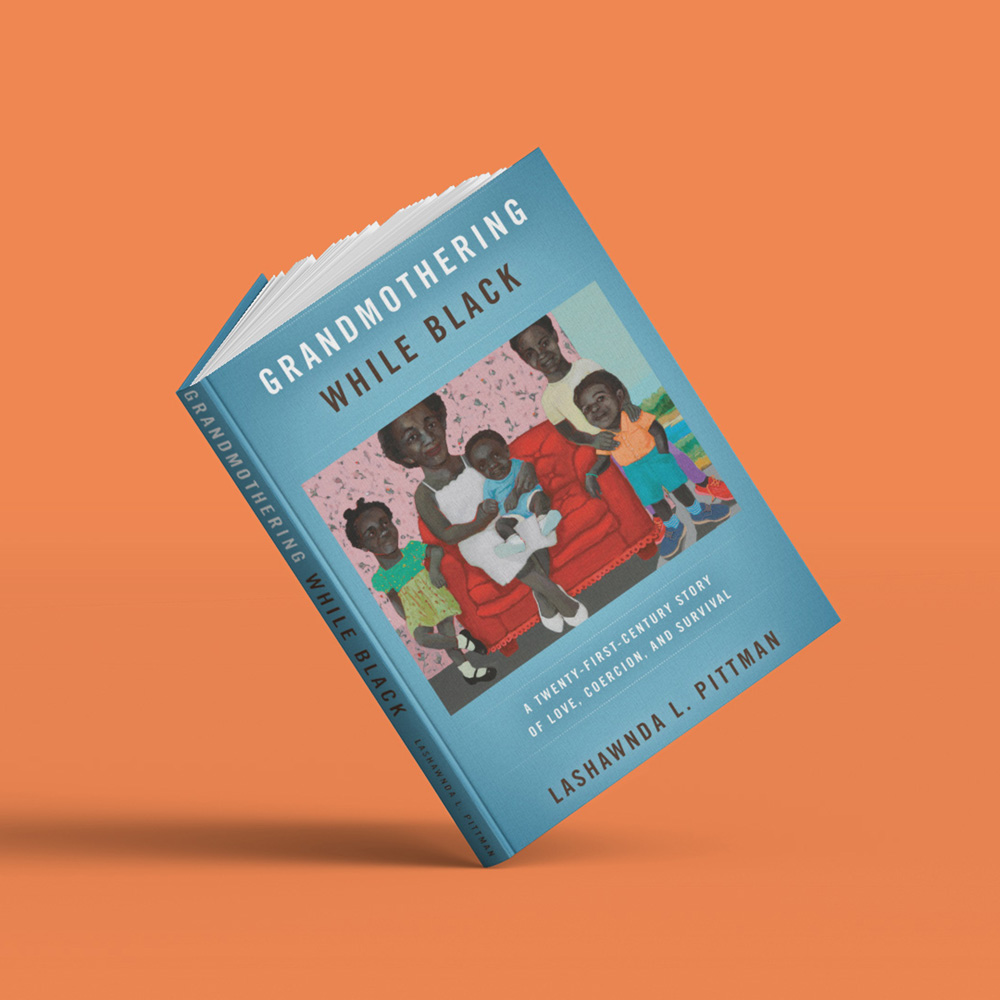When it comes to caring for and educating children in the United States, Black grandmothers have never been on the sidelines. Since the end of enslavement and the beginning of Reconstruction, through the Civil rights movement and beyond, Black grandmas have acted as a family and community glue, giving care, building and maintaining social and kinship ties, and raising children. But today, the nature of their caregiving, and the systems and pressures Black grandmas must navigate in order to care for their grandchildren are different, and more challenging and intensive than ever before.
Today, children across all racial identities are increasingly likely to live with a grandparent. The share of children living with their grandparents has doubled since the 1970s (from 3.2 percent to 8.4 percent), and more children are being raised by their grandparents today than ever before in U.S. history. The majority of these kids live in multigenerational households, where they receive care from at least one biological parent in addition to a grandparent. A growing minority of those kids live in “skipped-generation” households, that is, where their parents are not present and grandparents, especially grandmothers, are taking on the chief responsibility for their grandchildren’s care and well-being.
 In Grandmothering While Black: A Twenty-First Story of Love, Coercion and Survival – A Twenty-First-Century Story of Love, Coercion and Survival, University of Washington Professor of Sociology LaShawnDa Pittman dives into the emotional, financial, medical and legal struggles of their daily lives. Pittman conducted extensive interviews with 74 Black grandmothers heading skipped-generation households in the Chicago area. Pittman argues that they represent the growing number of families made up of our country’s two most vulnerable populations—children and the elderly—and that they have very few legal rights, while facing public policies not designed for families like them, as well as a host of intersecting inequalities and barriers.
In Grandmothering While Black: A Twenty-First Story of Love, Coercion and Survival – A Twenty-First-Century Story of Love, Coercion and Survival, University of Washington Professor of Sociology LaShawnDa Pittman dives into the emotional, financial, medical and legal struggles of their daily lives. Pittman conducted extensive interviews with 74 Black grandmothers heading skipped-generation households in the Chicago area. Pittman argues that they represent the growing number of families made up of our country’s two most vulnerable populations—children and the elderly—and that they have very few legal rights, while facing public policies not designed for families like them, as well as a host of intersecting inequalities and barriers.
Early Learning Nation magazine contributor Haley Swenson interviewed Pittman about the book and about what child care advocates and providers should know about the rise of grandparent-headed households.
Haley Swenson: Why did you feel it was important to focus on kids in skipped-generation households in particular with this book?
LaShawnDa Pittman: When I started this research, I was interested in Black grandmas raising kids. I had not gotten as nuanced as multi-generational or skipped-generation arrangements. It took just a few interviews for me to realize that these were very different experiences. I was primarily interested in a story of resilience and coping, and I felt like these women in skipped-generation households were having to cope in very different kinds of ways from other grandmas.
One thing that became really, really clear was that child-rearing institutions, like educational and health care systems, are not set up for [these skipped-generation families]. I was having conversations with them about just how difficult it was to navigate those institutions. That’s mainly because of grandmothers’ legal marginalization, relative to parents and to the state. Grandparents have no inherent rights to their grandchildren. That illuminated a piece of the puzzle for me, and I thought that was a really important story to tell.
We know that the bulk of grandparent caregiving happens informally, but even inside of that informal bucket, we include both no legal relationship at all and legal guardianship of various sorts, and depending on which state you’re in, that’s called different things. Sometimes it’s temporary. Sometimes it’s not. The decision to become a legal guardian was often driven by the need to navigate the childrearing institutions, to get healthcare or child care for the kids, or the need to protect children from their parents.
And then we’ve got formal arrangements, which include some relationship to the child welfare system. The child welfare system has increasingly relied on relatives to provide care, and in many states they get less support for that care than non-family foster care providers. It really became apparent that the relationship with the child welfare system is something that is shaping contemporary grandparent caregiving in a way that prior generations just did not have to deal with.
Swenson: In one of the final sentences of the book you say Black grandmas are like “canaries in the coal mine, warning us of the dangers of transmitting social injustices from one generation to the next.” I think one of the ways the book shows that happening is with messy, almost impossible-to-navigate social and family policies.
Because of their legal marginalization, grandmothers describe immense red tape to get access to basic care and financial support for their grandkids. What are some of the things that these grandparents have to go through and negotiate in order to get by, whether that’s by keeping their jobs, or accessing benefits their grandchildren should be entitled to receive?
Pittman: When it comes to resources, it’s like, well, if I don’t get these resources, my grandkid could be taken, but if I do get these resources, then perhaps it exposes me to a whole set of issues that I wasn’t anticipating, and my grandkids could be taken.
Even with their best efforts, their best efforts have no match for the sort of structural issues that they face or that they were already facing [before taking in their grandkids]. They’re largely Black women, or indigenous women, who were already economically marginalized. And there are two kinds of issues they face when they raise their grandchildren: How do I hold on to what I already had, and then how do I secure the additional resources they need?
On housing, here is a kid that’s now living in my home that I did not expect to be here. For some folks, it might mean not having enough room, for others, a safe enough community or home. For others it was the child welfare system requiring they have so much space and so on and so forth. So, they have to deal with these housing issues. Some grandmothers in my study have housing assistance, and so then [the change in their household] becomes an issue. How do I hold on to something that’s incredibly difficult to get in this country? There was a freeze on Section 8 housing in Chicago for well over a decade. We all know subsidized housing is becoming a thing of the past. There’s less and less of it.
One of the things I found that was really, really hard to hear about were the ways they were given misinformation about what was required in order to both utilize or hold onto their housing assistance. So, there are federal protections for grandparents raising grandchildren, in terms of not requiring legal guardianship of the kids that they care for, in order to have that assistance. And yet they were often told by street-level bureaucrats, the housing authority or landlords that they needed legal guardianship to have them in their houses. And there are all kinds of reasons why they don’t want legal guardianship. They might hope they don’t have to do this for long, or they don’t want to hurt their children, the children’s parents, who might be relying on some of the benefits they get to raise other kids.
The majority of these caregivers are still working. So, they might ask: How do I maintain my work and take care of this kid, and if that kid is under five, how do I get child care? We know in some places, child care is more expensive than rent. And child care subsidies are not set up for these families. To get these subsidies, a grandma might need to get custody taken from their parents, or her income might hurt her eligibility or her health might be too poor to work the required hours to qualify. And, we know grandparents provide a significant amount of child care as it is. So, who do they go to when they need to drop them off, when they are the person everybody else comes to?
I saw women who were already marginalized and fragile, vulnerable, having to decrease their work and income. Then I saw women who had to increase work, who didn’t have the health at times to do that, or were retired and had to go back into work. I saw women do more informal work, selling dinners, selling cigarettes, things like that just to get income coming in.
Swenson: There’s a strong belief among many early educators in “whole-family solutions,” not just providing care and education to the kids but giving some wraparound services, job training for parents, healthy food, to the whole family. I’m struck by what you say in the book about how few of these families are even accessing that formal care and education for young children. It’s heartbreaking to think of this whole field of educated, compassionate people who want to be doing this work for these families, and that they’re unable to access the families who really need it, that you describe in your book.
What would it look like if our child rearing systems were remade, to meet families as they are, and to really work for grandmother-led families. What would be different? What kinds of changes would you like to see?
Pittman: If we were actually creating policies that made it less difficult to get the resources that these families need in terms of housing, in terms of child care, when it comes to resources, the outcome would be improved mental and physical health. We talked about the burden of securing these resources, and remember that’s on top of experiencing multiple systems of oppression, from racism to sexism to classism and to ageism. The stress of that, the impact on their mental and physical health, is real.
I imagine that if we addressed that, instead of blaming individuals or the parents for what they aren’t doing, these grandmas would be around longer, and they’d be around with better health, mentally and physically. And that means the kids would be having a better parenting experience. Imagine kids who are getting their needs met, because our child rearing institutions are thinking about the whole family. Without that mental load, they’d all be able to breathe and to get the respite that they need.

Haley Swenson
Haley Swenson is a research and reporting fellow for Better Life Lab, the intersectional gender equality and work program at the non-partisan think tank New America. She is also editor and co-founder of Work Life Everything.


